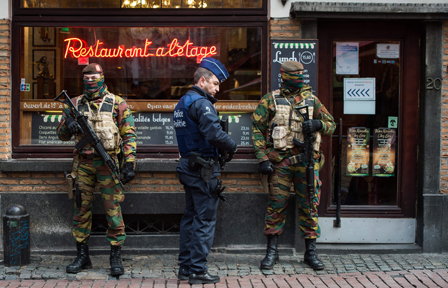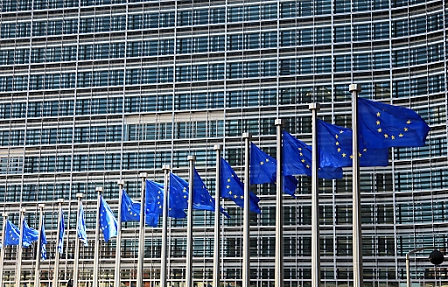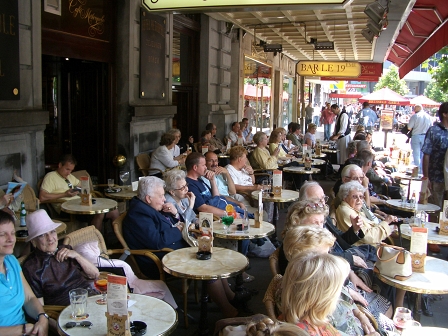Erstellt am: 7. 12. 2015 - 11:30 Uhr
Safety or Privacy? Is it a Choice?
FM4 Reality Check
Am Montag auf Radio FM4
It’s an interesting but fraught time to visit the centre of European politics.
In the wake of the terror attacks in Paris, Europe is grappling with the balance between personal liberties and security. We want to live normal lives but we want to feel safe. It’s a tight rope walk that European officials in Brussels are debating furiously while outside their glassy buildings soldiers in tan camouflage patrol the streets.

APA/EPA/STEPHANIE LECOCQ
“We Europeans are aware that we have our values and we have our style of living,” Social Democrat MEP Evelyn Regener told me in a corridor of the European Parliament, once I had negotiated the heightened safety checks at the entrance. “Our discussion right now is about making sure we are safe but not afraid – that we are not stiffened by fear.”
Dieses Element ist nicht mehr verfügbar
"Getting On With Our Normal Lives"
Regener says you learn a lot about European resilience by looking around Brussels these days. She describes how after almost a week of lock-down with barely a traffic jam, with few people on the streets and public transport and schools closed, people have now returned to their normal bustling lives. There are the soldiers on the streets but the bars and cafés are teeming with life. “Europeans have always reacted this way; acknowledging that we had to invest in and improve security but meanwhile getting on with our normal lives.
But normal life may be different for European citizens in the future. Inside the glassy building of power, at a meeting of European Interior ministers on Friday, the EU moved to grant law-enforcement agencies access to information gathered by airlines such as names, travel dates, itinerary, credit cards and contact details. The parliament, stirred into action by the Paris attacks, is expected to endorse the new rules within a month.
The Austrian Greens MEP Michel Reimon sees this trend for more surveillance as flawed: “The debate has been hysterical and not rational,” he complains, pointing out that France has had the power to collect swaths of data and watch over public places for years already. “That doesn’t stop terror attacks. Maybe it makes the investigations afterwards a bit easier but in return we give up a lot of freedoms and trend is expected to continue. I see it as window-dressing to calm the public.”

EPA/OLIVIER HOSLET
Has Data Protection Facilitated Terror?
The flight data draft law had languished in the European Parliament for more than two years as liberal data protection advocates argued that it would infringe too greatly on the privacy of law-abiding EU citizens. Now the conservatives have been accusing the liberals of making it too easy for terrorists to strike. Angelika Mlinar – an Austrian Neos MEP and vice-president of the liberal fraction in the European Parliament – is outraged by such accusations:
“It’s just simply untrue. They should look at the European treaties and at basic rights. Data protection is a basic right. Just as I wouldn’t want to relinquish my right not to be subjected to torture, I don’t want to relinquish my right to protect my personal data.”
Othmar Karas is a conservative MEP: he wants to cool down the debate: “I won’t take part in any debate that accuses any particular political party of carrying any political responsibility for what happen in Paris. We won’t solve the problem with an ideological approach but rather with seriousness and pragmatism.”

Chris Cummins
A Warning from America
Interestingly one of the authors of the US anti-terror legislation, the Patriot Act, has warned the EU not to go too far. Republican Jim Sensenbrenner told Politico.eu that that law was a “cautionary tale that democracy depends upon a respect for civil liberties.”
The Lessons of Molenbeek
Evelyn Regener says the solution to make us safer is to avoid the social ghettos that have been allowed to grow in Europe such as the Molenbeek neighbourhood of Brussels, which had been home to several of the Paris attackers as well as a base for terrorists involved in a spate of attacks in recent years. It has been dubbed a den for Islamic radicals. Regener says she recently saw a documentary about Molenbeek’s social problems and dangers. The film was made in 1987 but it seems no one reacted. Regener says the best answer to our security problems is to act on our social problems:
“If you have a job, if you feel accepted in society, if you are really integrated; then it is clearly better than living in a parallel society. In the meantime of course we need security and that means strengthening our external EU bodies. And to do that we have to co-operate and to co-ordinate.”


